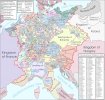PoD is 1) Albert I of Habsburg being successful in taking the Counties of Holland and Zeeland for the Habsburgs following John of Hollands death as he planned IOTL and more importantly 2) his son Rudolph surviving as King of Bohemia.
What happens next?
then I believe that to understand which of the two PODs are useful to the Habsburgs, we need to see what brought them into that situation, so we need to go back to 1282 when Rudolf I, with the approval of the princes, invested his sons Albert and Rudolph with the fiefdoms of Austria, Styria, Carniola and the Vindica March, at the same time elevating them to the rank of imperial princes. Previously, in 1276, Rudolf had convinced some ecclesiastical princes to cede some assets in that territory to his sons. With an ordinance of 1283 ( Rheinfelder Hausordnung ) Rudolph established that these territories would be entrusted solely to Albert and his heirs. His brother Rudolph would obtain compensation in exchange, in this way he had created the foundations of the future Habsburg power.
The attempt to ensure Albert's succession failed, because Rudolf was never crowned emperor. If he had succeeded in this aim, he could have ensured his son's election as king, even though, during the reign of Rudolf, there were 8 popes, and twice it was possible to establish a deadline for the coronation, this never took place, but apart from this "small" problem, Rudolf also had to deal with the effects caused by the great interregnum, inspired by the "Reichslandfrieden" of 1235, he decided to negotiate with the individual great feudal lords in the west and south of Germany, in particular in the Austrian Landfrieden (1) in 1276 and in the Bavarian ones , Rhenish and Frankish in 1281, but he also tried to establish order in more peripheral regions of the empire : see in 1289/90, in Thuringia, where he had 66 castles that housed knights who had turned to brigandage demolished, turning west, in 1281 he forced Count Philip I of Savoy to cede some territories to him, then forced the citizens of Bern to pay the tribute they had refused
This policy was especially successful in the territories close to Rudolf's base of power, or in the southern regions of the Reich, on the contrary, in the more distant areas, although it tried, with the help of allies, to recover imperial assets and to guarantee the rights of the cities , did not achieve significant results, finally his attempt to secure control of Burgundy was short-lived, as his successors were unable to maintain Burgundy in the face of the aggressive expansionist policy practiced by the French monarchy towards the empire, finally fearing that the Habsburgs would become too strong, the princes chose Adolf of Nassau over his son Albert I upon his death ( which will be further emphasized later with his grip on Bohemia and attempts to impose centralized control in Germany, which was frowned upon by the princes )
upon the death of Rudolf and then of his son of the same name, Albert found himself ruling over the two duchies of Austria and Styria, but he soon aroused widespread discontent among his new nobility, due to his policy of sidelining local families and replacing them with Swabian nobles linked to him, especially the counts of Wallsee. The first revolts took place in Styria, in 1291, and in 1295 it was the Austrian nobility who revolted. Even in Vienna, Ottokar Přemysl was preferred to Albert for a long time, also due to his substantial commercial relations with the Bohemian area
finally after having temporarily resolved the issues in his possessions, Albert, seeking the help of the imperial princes to form a of a coalition against Adolf, in the end he succeeded and succeeded him in 1298 ( the dispute ended in the battle of Göllheim ) finally thanks to marital relations with France, Albert managed to stipulate a peace treaty with Philip IV the Fair, with the which was in conflict over border issues
after having forced the archbishops and the Count Palatine of the Rhine to capitulate on customs duties, he found himself in conflict with Pope Boniface VIII since the latter was against the dissolution of the college of princes, papal recognition came only in 1303, in exchange for important concessions that severely limited imperial authority ( especially in Italy, but which were only the confirmation of the concessions made by his father 30 years ago to obtain the support of Rome )
as well as quarreling with the future HRE Ludwig IV over the Lower Bavarian possessions in 1307
he also obtained a sensational stroke of luck when he managed to place his son on the Bohemian throne upon the death of Wenceslas III, but the Bohemian nobility immediately rebelled and decided to overthrow him, Albert soon forced them to recognize the new king, who however, during the war companion, died of typhus, frustrating her father's efforts, like his father Rudolf I , he tried to make imperial power felt also in the northern areas of the empire, with mixed successes, in the end he died while he was engaged in a controversy in Thuringia
after this brief summary regarding the reigns of Rudolph and Albert of Habsburg, there are some considerations to be made on the subject, the first concerns how the two sovereigns tried to rebuild imperial power in Germany, the second concerns the concessions they made to the papacy over Italy, , so let's start from the first point, that is, how the Habsburgs tried to deal with the political division in the empire that was formed by the clashes between the Guelph and Ghibelline parties, in fact there was a strong fracture between the part of the Frankish culture origin with important interests in Italy and in the French-speaking part of the empire, to the detriment there were the regions of Saxon origin who disapproved of this transfer of power, away from their control and which made them lose interest in continuing to support the eastward expansion against the Slavs and strengthening the ties with Denmark and above all with England ( from their point of view ) in particular they poorly tolerated the imperial policies of weakening the princes ( which affected them the most, given that they were the nobles with the greatest accumulation of dominions in the Reich ), therefore for recap what we have here : two totally opposing political currents, divergent cultural and economic ties, existing dynastic conflicts plus the struggle between papacy and empire ( allowing the nobles and popes to make common cause against the over-exaggerated ambitions of the Emperors ) well in the chaos resulting from the long imperial interregnum which did not see an Emperor truly recognized as such until 1307 ( also due to strokes of bad luck or stupid family feuds, following the temporary failure of the Habsburg dynastic policy ) the central government in the Reich was tremendously diminished ( also due to the continuous practice of selling possessions of the imperial state property to loyal nobles ) this combined with the ongoing dynastic wars ( between the Wittelsbachs, the Luxembourgers, the Habsburgs and in the background the Welfs ) so to better explain myself, we find ourselves dealing a conflict to two regions themselves ( with their components, who, depending on the circumstances, preferred one policy over the other ) clear example : the Wettins who in all this mess were aligned with the "Saxon party" while Lorraine tended to be more towards the opposite side, the same thing goes for the clergy ( who in this he skillfully played the two sides against each other to gain favor and weaken the central authority of Rome over them ) or even the imperial cities which were secretly supporters of the "Franco-Roman" government against the tendencies of the nobility of Saxon origin to subject the cities to their total control ( see in fact that in the eastern part of the Reich free imperial cities do not exist, just as there are not even large agglomerations of ecclesiastical territory vaguely similar in size to Trier, Mainz etc ) funny curiosity, this "division" almost follows the one created two centuries later, with the advent of the Reform, see it as a symptom, which allows us to understand how far the direct power of the Emperor can more or less reach, which then led to the creation of the Golden Bull and the officialization of the Electors ( who in practice had to represent the " imperial power " in their territories, and if known faithfully followed this clear difference of ideas in the Empire, but which in reality were the Emperor's recognition that he could not exercise his power in certain areas without having the consent of the local elites (2)
then if it can resist a coalition of princes ( probably supported by France, because the Habsburgs would now pose a serious threat ) against it, Albert will have to work hard to consolidate his disparate territories and support Rudolph's government in Bohemia, surely the step next is to try to re-establish some semblance of royal authority in Italy ( because only the coronation can guarantee some security in the succession of his son to the role of Rex Romanorum ), in particular it will be useful to maintain good relations with the papacy ( but seeing as Albert had sided with Boniface against Philip it shouldn't be too difficult, at least at first, this could already change or annul the Avignon captivity of the Papacy as well as the fate of the Templar Order ( which here could very well be merged with the Hospitallers, given that it was one of the many ideas that circulated on what to do with them ) in finally to get an idea of what to expect on the peninsula, it is enough to look at the last truly important campaign in Italy Otl, carried out by an Emperor to regain control of it ( obviously before Charles V ), i.e. that of Henry VII, who managed to subjugate a good part of Guelph Tuscany, install two imperial vicars in important positions ( the Viscontis in Milan and Casalgrande in Verona ) and actively intervene in the politics of the municipalities to calm the fights between opposing factions and managed to face the influence of Naples in the north of the peninsula in support of the Guelphs, with good results
therefore in conclusion I do not see the Habsburgs completely canceling and subjugating the princes of the empire but rather as their Otl successors did, choosing those placed in strategic places of the Reich ( mainly I imagine that they choose them in places where the direct influence of the imperial office is weak, although I believe that there may be fewer of them than the 7 of Otl and more geographically spread out ) and raise them in a possible Golden Bull, their policy with the free cities and Italian municipalities will be interesting instead ( which are still a fundamental part of the empire, because it is good to remember, the part of the title of the HRE "of the Germanic nation "was added only by Maximilian after he realized that there could be no direct power in the peninsula )
1) was a legal system, which was based on an agreement which sanctioned the renunciation, by the lord of a territory, of the exercise of the use of force to assert his rights: this affected first of all the right to conduct feuds.
Being contractual in nature, a Landfrieden had a limited duration and territorial scope
2 ) this is further revealed if we look at the Italian reactions to the proposals of a Golden Bull by Charles IV, which were mainly of happiness, hope and then disappointment ( once they saw the final result ) because they thought that this idea could very well adapt also for the Italian situation, many eminent Italian writers and politicians hoped for the inclusion of an Italian representative ( who could establish and take advantage of imperial laws and privileges without having to constantly request the intervention of the Emperor on the peninsula and his stay there for long periods, so much so that he didn't even have to anger the papacy, especially after the long stay of Henrich VII and Ludwig IV in Rome itself, in the political thought of the time it was a good way to allow having a representative who exercised the power of the Emperor by proxy but who was also capable of orienting himself in Italian politics without depending on the support of German resources, but who also allowed him to have his say on the choice of the future sovereign, in fact there were many who pushed for a review of the law in the decades following it ( in particular under Sigismund and in the first years of Maximilian ) but also previous ones ( just think that Ludwig IV played with the idea of making a similar reform, but also including the peninsula in the process ( some historians even say that he wanted to include not a noble family but a city state ), as it is known that the policy of favoring the imperial cities over the princes that the Habsburgs were known to use in Germany, in Italy it would have been potentially good for recovering lost political ground and influence, potentially putting the cities in competition with each other


